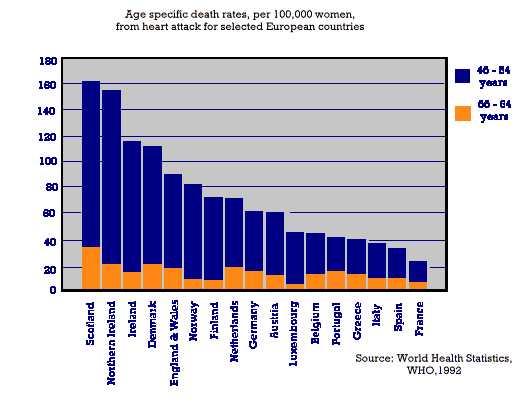Death rates declining more slowly for women
Death rates from CHD vary from country to country, with higher rates in northern Europe (UK, Denmark and Ireland) and lower rates in southern regions. Although mortality has declined, primarily in countries where smoking, high blood pressure and cholesterol are down and physical activity is up, the decline has generally been slower in women than in men (Khaw, 1994). Some studies show that the rate of death from heart attack is greater for women than for men. Moreover, women who undergo coronary bypass surgery have nearly double the mortality rate (Wenger, 1996).
Longer lives greater disabilities
CHD is also a major cause of serious illness and disability, particularly for women,who may live on average five or six years longer than men. More than one-third of women aged 55-64 with heart disease are disabled, and more than half those over 75 (Wenger, 1996). Disability is costly by both quality of life and economic measures. For example, cardiovascular diseases among older women are the leading cause of hospital admissions and the major reason for general practitioner consultations in the UK (Khaw, 1994). The Task Force of the European Society of Cardiology, European Atherosclerosis Society and European Society of Hypertension strongly advocates preventive strategies. The Task Force has published a detailed report on scientific studies and specific guidelines for clinical practice that can serve as a standard for all Member States (Pyorala, 1994).
Historic inequities
Until recently, it was assumed that findings from the thousands of CHD studies on men conducted since the 1960s would apply equally to women. However, evidence to support this view is lacking (Isles, 1992). Women and older people of both sexes have rightly been called “the understudied majority” (Wenger,1992). The dearth of data on women – especially older women leaves many questions unanswered, such as how female hormones affect cholesterol levels, whether aspirin is as effective for women as it appears to be for men, when blood pressure medicines should be prescribed, which ones and at what dose, how dietary recommendations might differ, and the most effective way to motivate lifestyle changes among women.
Comprehensive data are now being sought. Seven Member States are among the 27 countries participating in the WHO MONICA Project (Multinational Monitoring of Trends and Determinants in Cardiovascular Disease), a 10-year study to develop international, comparable data on heart disease. Begun in 1985, the study was designed to assess the impact of various risk factors, daily living habits, health care and socioeconomic factors on heart disease in defined communities throughout the world (Tunstall-Pedoe,1994).
In addition, standards of care are not equal. Studies show that women are only half as likely as men to undergo cardiac testing for symptoms suggesting heart problems (Ayanian, 1991; Steingart, 1991). The economic and public health implications of divergent standards are enormous.
| [ EIWH | CHD | Cancer | Osteoporosis | Depression | Advisory | Foreword | Overview | Future | Main | Policy ] |
Copyright © 2000, 2006 European Institute of Women’s Health


